Diseases & Fungi
Common Plant, Tree Diseases and Fungi Treatments
Fungus and Disease are common to Dogwoods, Crabapple, Flowering Cherry, fruit bearing trees and evergreens. These include Leaf Scab, Rust, Black Spot, Needle Cast, Diplodia Blight (which kills the new growth on evergreens) and Anthracnose.
Call an accredited licensed professional at the first sign of noticing a tree or shrub is in decline. By decline we mean spots on leaves, excessive leaf or bark loss or perhaps unusually light-colored foliage. It is imperative to act as soon as possible.
It is important that the correct procedures and steps be taken at certain times of the year when the risk of disease and insect damage is most prevalent.
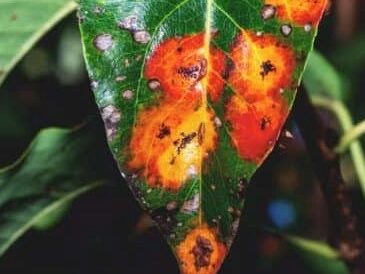
Leaf Scab and Rust Fungus – Scab and Rust fungus are caused by fungi that invade crabapple, apple, hawthorn, common pear, and other ornamental plants in the rose family. Scab and Rust rarely kill their hosts. If ornamental trees such as crabapples or hawthorns are severely infected by these diseases; however, the ornamental value of the plants may be lost.
The fungi that cause scab and rust diseases attack new growth on the host plants, especially in early spring. With average weather conditions and properly timed applications of fungicides, we can achieve acceptable control. Generally, T&T makes three applications, timed approximately 7 to 10 days apart, weather permitting. Like most fungi, it can take several years to achieve control.
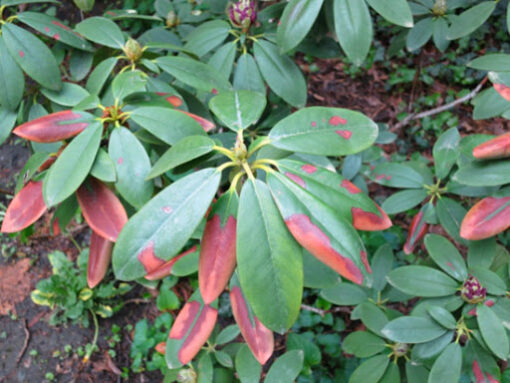
Winter Burn – If the foliage or needles appear to be “singed by fire” or dead, this problem is Winter Burn. The damage is caused from dehydrated plant tissue during frigid winter months.
Winter Burn can be prevented by applying TransFilm oil that helps to seal the leaves/needles on all evergreen trees and shrubs and reduces dehydration. The seven plants that need extra protection from Winter Burn are: Boxwoods, Rhododendron (pictured), Azaleas, Hollies, Cherry Laurels, Magnolia and Cypress.
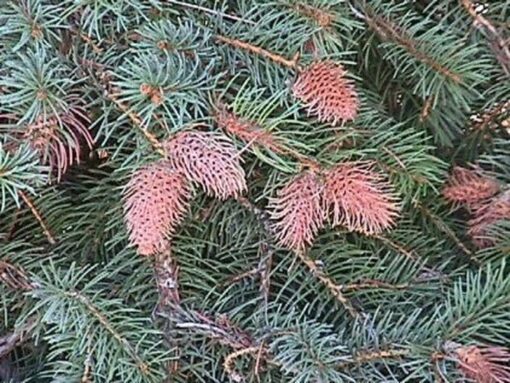
Needle Cast Disease (NC) is a fungal disease of Spruce Trees that causes needles to turn brown and fall off. NC is treatable. Within a few years after treatment, the infested Spruce can look beautiful again. T&T uses a fungicide, applied during the early growing season at 10 to 14-day intervals and four (4) applications are recommended.
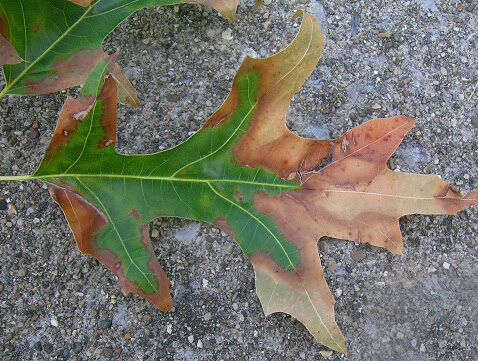
Bacterial Leaf Scorch (BLS) is a chronic disease caused by Xylella fastidiosa. It infects the vascular system of many woody landscape trees and plants. The disease restricts water transport within the plant, causing a slow but progressive decline in plant health, which can eventually result in death. BLS is common to Pin Oaks.
T&T recommends annual fall fertilizing and a once-every-three-year treatment of growth inhibitor. In combination, the fertilizer provides additional nutrients to the affected plant while the growth inhibitor reduces growth and thickens the leaves, giving the tree a sustainable canopy for photosynthesis.
Fertilization – like your lawn, trees and shrubs need to be fertilized. Trees compete with grass for nitrogen in the soil. A well-balanced fertilizer delivers complete nutrients for leaves and roots. T&T recommends injecting fertilizer into the root zone of the tree in the fall. This provides long-lasting nutrients during the winter months as the roots absorb moisture. In the spring and summer, trees and shrubs can benefit from a topical fertilizer to the leaves/needles. T&T also utilizes supplements to improve the color and root support.
Growth Inhibitor – limits the growth of a tree or shrub that may be too large for the space available. It is particularly effective for ornamental trees as well as large tree, growing close to the home. This application, applied once-every-three-years, reduces the growth and thickens the leaves.
At T&T, we use Integrated Pest Management (IPM) in conjunction with Penn State Co-operative Extension Services to help keep us informed about which insects and diseases are most active in our area and the best methods for control.
We can have your soil tested for pH and nutrient levels, providing a comprehensive regime for Plant Healthcare.
The Organic Materials Review Institute (OMRI) is an international nonprofit organization that determines which input products are allowed for use in organic production and processing. OMRI Listed® products are allowed for use in certified organic operations under the USDA National Organic Program.
